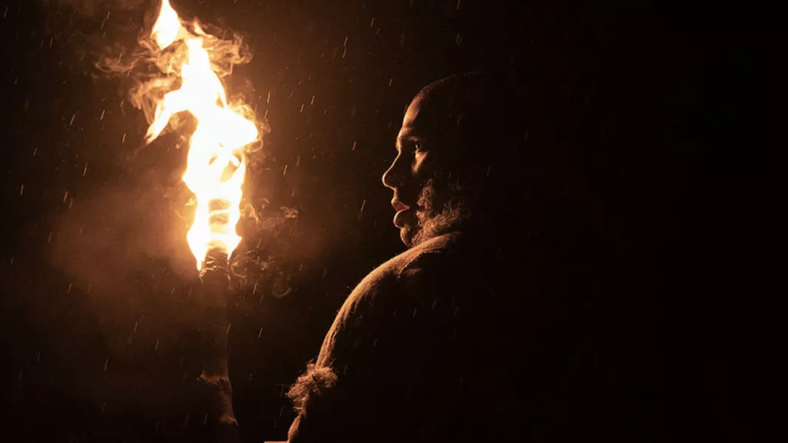‘Out of Darkness’ Digs Into The Violent and Monstrous Roots Of Our Past [LFF ’22 Review]

Much has changed since the Old Stone Age in which Out of Darkness takes place. But a lot hasn’t. The feature debut for director Andrew Cumming and writer Ruth Greenberg is a primal Paleolithic horror that suggests that the roots of our violent patriarchal structures reach deep into our past.
Set 45,000 years ago, the film follows a small band of homosapiens in search of a better life. Steered by their feared leader Adem (Chuku Modu), they arrive on the shores of a promised land only to find it empty—no food, no shelter, no hope. Ancient Albion is barren.
Genre fans hoping for roaming mastodons and saber-toothed cats might be disappointed. Fortunately, though, there is something out there in the dark. And it’s caught the group’s scent.
Beyah (Safia Oakley-Green), a young ‘stray’ new to the company, has begun to bleed. Stressful enough, you might think, but made worse when alpha male Adem takes a newfound interest in her body. For the shaman Odal (Arno Luening), Beyah’s sexual maturation presents a different issue. She’s on heat, he says, and the monster can smell it. Oh to be a woman, eh?
The result of a grueling shoot on Scotland’s gale-hammered highlands, Out of Darkness looks and feels magnificent. Cinematographer Ben Fordesman brings a similar dreadful dynamism to the movie as he did to Saint Maud, with twisting camera movements that hint at the inversions to come, as humans become savages and predators become prey.
Adam Janota Bzowski, another Saint Maud alumnus, scores Out of Darkness with vigor, his aching drones cracked by thunderclap percussion whenever the blood starts pumping. And it does, especially when the film trades the plains for thick forests as Adem, a man bloody-minded and blinded by pride (among other macho ailments), leads the gang into the maw of whatever is hunting them.
From great bogs to dank caves, every location feels treacherous, and the burden felt by the cast and crew is clear throughout. But nowhere is their commitment more evident than in the dialogue. The film unfolds in a fictional language derived from Arabic, Basque, and Sanskrit. Known on set as TOLA (short for The Origin language), the actors whisper, bawl and bellow it as if it was their mother tongue. Coupled with a devotion to period accuracy elsewhere, it makes for a world that’s inviting, immersive and intense.
With some scenes shot only in natural firelight, the darkness can be stifling, wringing tension from every near-encounter. Deep into the picture, however, its pursuits become circuitous and some skirmishes threaten to outstay their welcome.
Naturally, not everyone makes it out of these sequences alive. When a power vacuum emerges around Beyah, she’s ready to step up and take charge where Adem’s sensitive brother Geirr (Kit Young) can’t. As much as it’s essential for Out of Darkness to elevate its lead to a position of power, though, with the herd thinned there’s a void at the heart of the film that no amount of shrieking and viscera can fill. Things are stretched too thin. The world suddenly feels much empiter.
Things are less assured in the second half. The monster-related bait-and-switches don’t stand up to scrutiny and the climax, though taut, is also somewhat cynical. But it’s easy to overlook such foibles in the bloodied face of such ambitious storytelling.
Something of an origin story for man, for woman, and for the chasm that still exists between them, this is also a sharp feature origin for Cumming and Greenberg. It’s a proper dirt-under-the-nails debut and a fierce case for British genre filmmaking. Its conclusion might be too neat and tidy for such a scrappy story. But, in Beyah’s final line, there’s a grim sense that this woman’s work (and ours) is far from over. What now? “We try again.” We’re still trying.
Summary
‘The Origin’ is a proper dirt-under-the-nails debut and a fierce case for British genre filmmaking.

